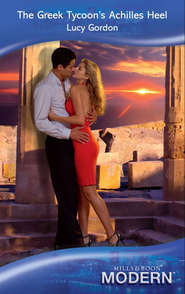По всем вопросам обращайтесь на: info@litportal.ru
(©) 2003-2024.
✖
A Proposal From The Italian Count
Автор
Год написания книги
2018
Настройки чтения
Размер шрифта
Высота строк
Поля
‘You really remembered all that?’ he would exclaim. ‘Well done! You’re in the right business.’
‘I get it from you,’ she had reminded him. ‘I remember when I was a child there were lots of times you made people gulp at what you could remember without having to look it up.’
It had been a happy moment, uniting father and daughter. He had been proud—not only of her memory but her ability to choose the best stock. Knowing this, she had felt her confidence grow, and she had begun to see herself as a serious businesswoman.
Just occasionally her father had given her a little warning advice. Once, when a temporary employee had flounced out in a temper, he’d said, ‘Did you have to be so hard on him?’
‘I wasn’t hard on him,’ she’d protested. ‘I just pointed out that he’d got something wrong. And he had.’
‘You might have been a bit more tactful.’
‘Oh, come on, Daddy,’ she had said, in a teasing voice. ‘What you mean is that a woman mustn’t tell a man that he’s wrong in case he’s offended. But we’re not living in the nineteenth century.’
He’d patted her hand. ‘You may not be, darling, but a lot of men are. You’re a bit too fond of giving orders.’
‘Too fond for a woman, you mean? You think I should just go along with him? Even when I know he’s an idiot?’
They had laughed fondly together, but she’d come to understand that he had been making a fair point. She had learned to speak with more care, but it was still exasperating to have to do so when she knew she was an expert.
She had gradually come to enjoy the feeling of being in command—not merely of their employees but of the whole running of the place. She had chosen stock and it sold well. She’d had the instincts of a talented businesswoman, and they had given her hope for the future.
But her hard work had come too late. Matters had started getting worse, owing to the mountain of her father’s debts that had piled so high that even her commercial success could not completely deal with it. Finally her father had been forced to sell the shop.
By then his life had been drawing to a close. Rik, the new owner, had reluctantly allowed them to stay in the little apartment upstairs, and Jackie had continued to work in the shop—but only part-time, so that she could always hurry upstairs to check that her father was all right. She nursed him gladly, giving him everything in her power in return for the loving care he had always shown her.
‘It’s so hard for you...to be caring for me and working downstairs as well,’ he had said once. ‘Such a burden.’
‘Stop it, Dad. You could never be a burden to me. Never.’
‘Bless you, darling. I wanted to leave the shop to you. I’d have been proud to give you a legacy. I hoped once—But there. It just didn’t work out.’
She would have loved to own the shop. So much of its success was due to her work, and it still held the atmosphere created by her beloved father. But she had known she must abandon that dream.
Her father had died a few days later. And then Rik had offered her a lifeline.
‘You’re welcome to stay if you become full-time. You can go on living here.’
She’d thought carefully before agreeing. She disliked Rik—an ill-tempered man in his forties—But she had accepted the job because it would give her a little time to work out her plan to escape into a new life—one in which she would have her own business, organising everything, using the talents she’d so gladly discovered.
Her dislike of Rik was well-founded. He had a high opinion of his own knowledge and skills, but Jackie felt that he actually knew very little. He made silly mistakes for which he blamed her.
She had tried to save money, hoping that soon she would be able to afford to leave and explore new possibilities. But it had been a hopeless task. Following George’s death had come the discovery of more debts that he hadn’t managed to pay, even with the money he’d made from selling the shop. Her savings had soon been swallowed up by them. And she had no hope of saving much more, given the meanly low pay Rik allowed her.
‘I give you a fair wage,’ he would say. ‘You live here for nothing. If you worked somewhere else you’d have to pay for accommodation.’
It was true. Frantically she had hunted for another job, but hadn’t been able to find one that paid enough to solve the problem. Now she felt trapped, and with no obvious way out she just had to hope for a miracle!
She showered and dressed carefully. She presented a picture of efficiency—ideal for the work that consumed her life—but her looks didn’t please her. She considered herself far too plain.
She opened her laptop and logged on to her bank to check the state of her account. The result made her groan with despair. She had very little money, despite her attempts to live frugally.
Dispirited, she opened an astrology website, and read her prediction.
The fates are planning a startling new beginning for you. The sun in Jupiter will bring things you never anticipated, and decisions that will change your life.
In her dreams, she thought wryly. Last week it had said she was going to be a millionaire. And look how that had turned out.
She read the prediction again, trying to see it as the approach of the miracle she longed for, and then hurried downstairs and opened up the shop. She served a couple of customers, then spent some time looking around.
The shop had a variety of stock, including home wares and groceries. She often wished she could persuade Rik to show a little more imagination about the stock. But he had no sympathy for her ideas.
‘This is a practical place, full of practical items,’ he’d once told her sternly. ‘You’re too fanciful, Jackie. That’s your trouble. You want life to be fun, and it isn’t designed that way.’
‘Not always fun,’ she’d protested. ‘Just a little bit of excitement now and then. I remember Daddy felt the same.’
‘You father spent too much time looking for fun. It was his ruin.’
‘Something ruined him...’ She’d sighed. ‘But I don’t think it was that.’
‘Get on with your work and stop wasting time.’
* * *
On the flight from Rome to London, Vittorio sat sunk in thought, wondering where the search for George Benton would finally lead him. Common sense told him he need not search at all. If he simply refused, who would ever know?
But his conscience would know. His promise had brought his father peace in his final moments. If he broke his word the knowledge would be with him for ever. And somewhere in his heart he sensed that his father’s reproaches would always haunt him.
Everything had changed with Franco’s death. He’d spoken of the pleasures of being Count Martelli, and Vittorio had soon discovered that it was true. The first time someone addressed him as ‘Signor Conte’ he had hardly been able to believe he’d heard correctly. His employees now treated him with deference, almost awe.
But his father had also spoken of other things—of the hidden problems behind the glamour, that the rest of the world knew nothing about. And here, too, he had been right.
Vittorio had gone through Franco’s things, seeking clues about his father’s past life and George Benton. He’d found a photograph of the two men together, which must have been taken during their meeting in England many years before.
How old would Benton be now? Middle-aged? At the height of his powers? Ready to take revenge on the family that had cheated him out of a fortune? He wasn’t looking forward to their meeting, but there was no choice.
Franco’s papers had also included a newspaper cutting, mentioning a shop called Benton’s Market. There was a picture of a small, shabby-looking shop, and one of George Benton, looking older than in the other picture.
That was Vittorio’s clue. He had a lead.
At the airport he hired a taxi and spent the journey studying a map of London. The area he sought was just north of the River Thames in the east of the city. As they approached the area Vittorio asked the driver, ‘Is there a hotel near here?’
‘There’s one just around the corner. Mind you, it costs a lot.’
‘Fine. Take me there.’
The hotel was pleasantly luxurious. He booked a room for the night, then went out to explore.
Almost at once he saw a corner shop with its sign proclaiming ‘Benton’s Market’. He took a deep breath, clenching his fists, vowing not to lose his nerve now.











